Living with Hearing Loss and Becoming a Bilingual Audiologist Mom
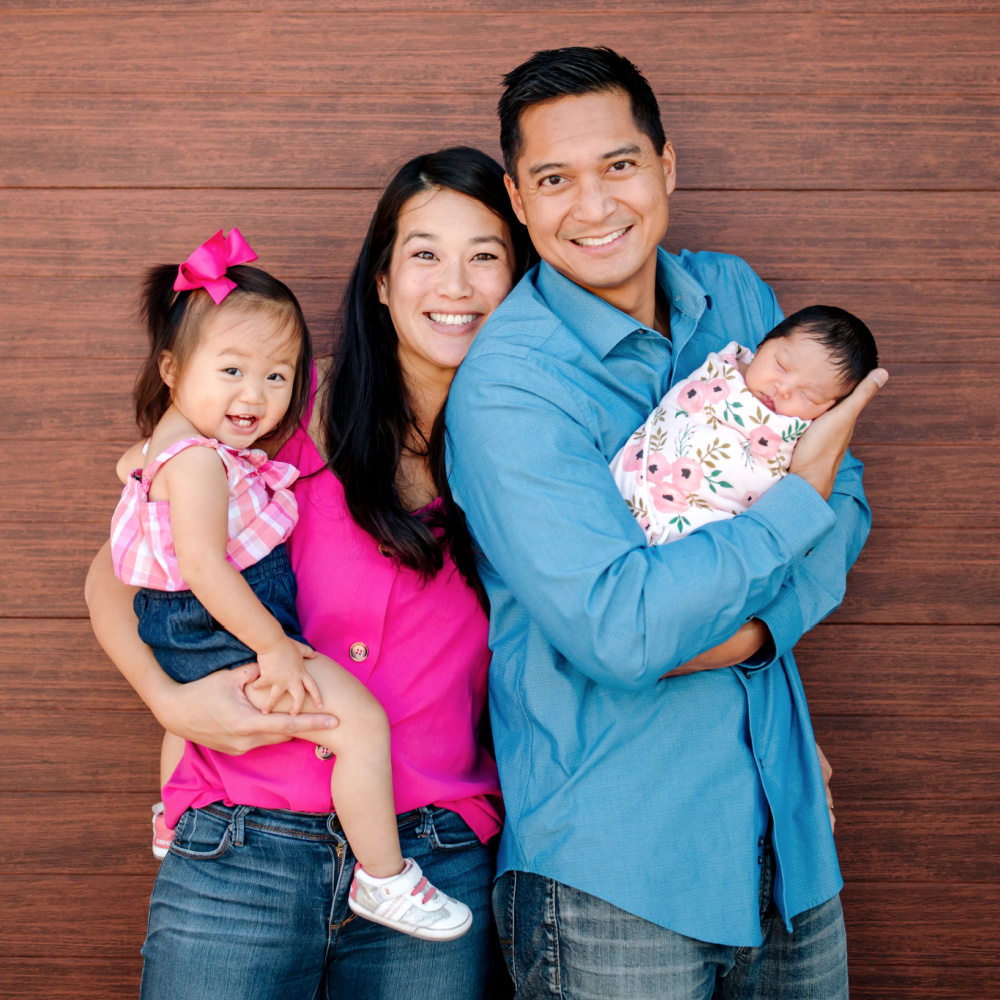
Last year, I was so grateful when pediatric audiologist, Dr. Michelle Hu, reached out to me! I quickly became inspired by her candid sharing and genuine heart, and I think you’ll love getting to know her, too! Today, she shares her experience about living with hearing loss, acquiring languages, and raising multilingual children. She also gives helpful advice and a behind-the-scenes glimpse of her audiology work.
About pediatric audiologist Dr. Michelle Hu
As a child, Dr. Hu was diagnosed with progressive hearing due to Enlarged Vestibular Aqueduct Syndrome/Pendred Syndrome. She now professionally and passionately serves the Deaf and Hard of Hearing community. She is also a bilingual, Chinese-American mom of 2 beautiful children and a military spouse!
Dr. Hu gives an overview of her journey in this special interview!
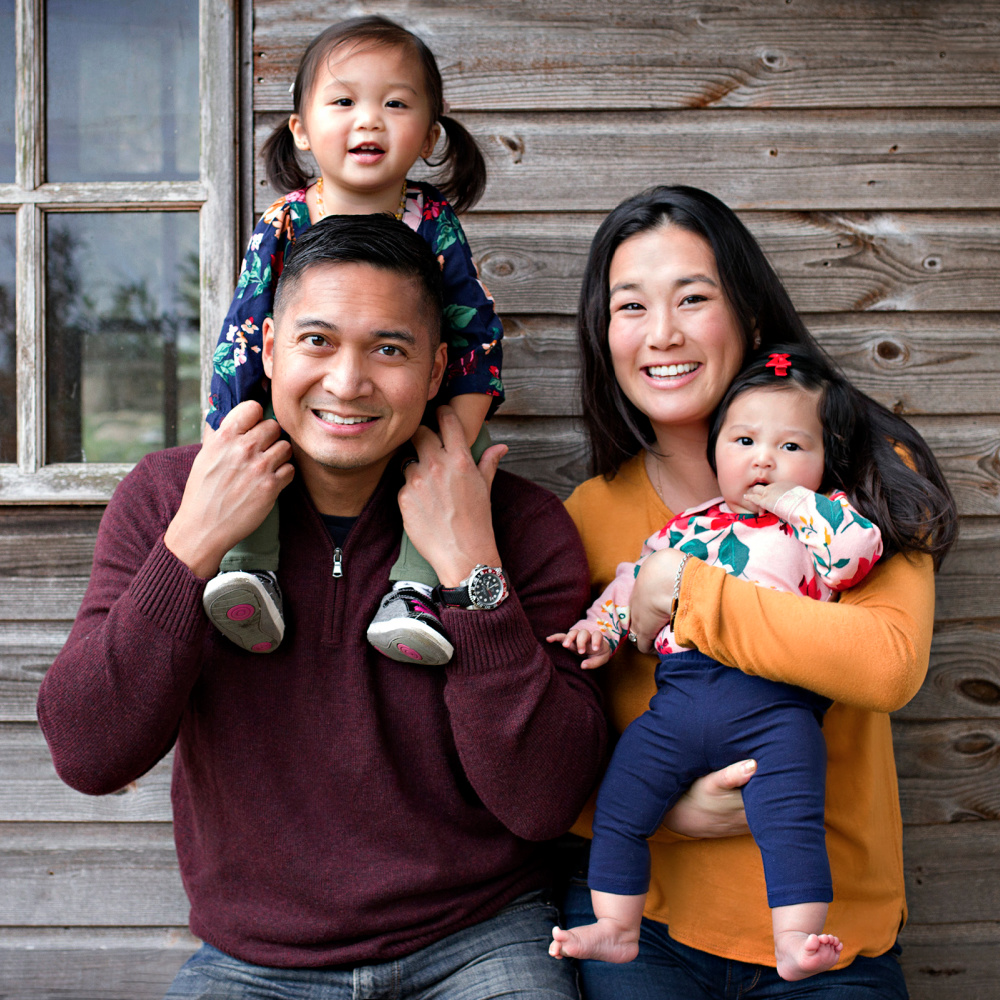
Welcome, Dr. Hu! I’ve am very inspired by your journey! When were you diagnosed with hearing loss?
I wasn’t diagnosed with hearing loss until I was 3-4 years of age. They didn’t do hearing screenings in the birth hospitals yet back then.
My preschool teacher told my mother that I was going off on my own during story time – to either sing or read a book alone. I had an audiological evaluation and was fit with bilateral hearing aids soon after that.
At this time, I only had a mild hearing loss. I developed fairly good speech and language, because kids this young are usually near their parents and speech is fairly clear and loud enough.
My type of hearing loss is progressive in children – so every time I hit my head my hearing loss would get worse.
I was considered a cochlear implant candidate by age 10 years. However, I didn’t get one for over a decade, because my parents weren’t sure about the technology, and I was thriving in school.
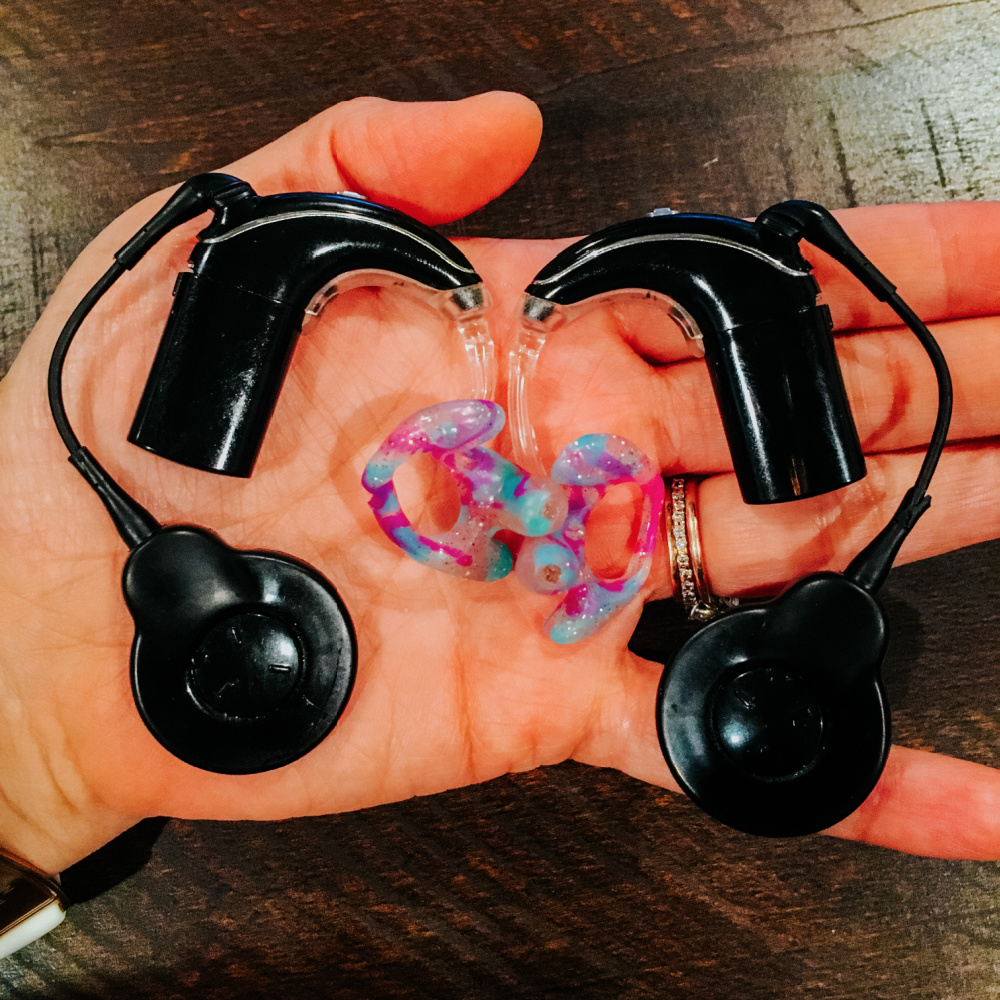
Many parents wonder if children living with hearing loss can learn additional languages. What languages do you speak and how did you acquire them?
When I was diagnosed with hearing loss at age 3 years, my mother was told that I would likely not go beyond a 3rd grade reading level. She was told to only speak English to me – as anything else would hinder my language progress.
Research has found this to be false!
I grew up in the US, in a small town in Ohio. We were one of only a handful of Asian families around, so I was almost always hearing English. My parents spoke primarily English and Cantonese at home, but I was also exposed to Mandarin and a Shanghai dialect when they had long distance phone calls to relatives.
My brother got to go to Chinese school on the weekends but not me. So he is able to carry on conversational Cantonese and Mandarin. I am receptive to most Cantonese but can only do very simple Cantonese conversation – like restaurants or small talk at home (where is this, do you want this, what are you doing etc).
I took up Spanish in middle school and continued that through college. I used it minimally in graduate school and now almost every day with Hispanic families at work as I am located in San Diego, CA.
Try this: Teach Your Child a Second Language at Home with 5 Key Steps
Can children learn ASL, a visual language, at the same time as spoken languages like English, Chinese, and Spanish?
I encourage language and sound submersion! I feel that our brains don’t work in compartmentalized languages – it just works with communication as a whole. Technically body language and hand gestures are “signs.” ASL is a series of organized gestures!
Dr. Michelle Hu, what languages are your children exposed to?
English is our primary language but my children are exposed to ASL, Spanish and Chinese.
American Sign Language
I knew about sign language, so when I became a mother, I started going to signing groups at the library and picked it up there. It’s been fun to expand our vocabulary as it makes her feel like we have a secret little language. It’s been incredibly helpful with the baby, when my toddler’s language was emerging and unclear and with tantrums.
Spanish
I also studied Spanish through out high school, college, and also use it at work in San Diego, California. Whenever the opportunity presents, I incorporate Spanish words and phrases into our daily life.
Right now, being submersed in a complete Spanish speaking conversation is daunting for me, but being part of a Spanglish conversation is much easier since we are going back and forth explaining and relating.
Chinese
My parents visit often, and my mom is incredible with my daughters. She teaches them songs from her childhood as well as phrases in Chinese whenever the opportunity comes up. My toddler will often ask what something is called in English and then immediately ask what it’s called in Chinese.
Try this: 20 Ways to Get Your Kids to Speak Chinese
Tagalog
My husband’s family is Filipino, so we are exposed minimally when Lola comes to visit.
When did you know you wanted to be a pediatric audiologist?
To become an audiologist in the US, you need an undergraduate degree, then doctorate of audiology – the program is 4 years. The last year is a clinical externship.
I resisted being a part of Deaf culture, anything hearing loss related for the longest time because I saw the word “deaf” or the culture/disability as weak.
It shifted when I had a sudden loss in hearing and my mom mentioned that I might make a good audiologist. I had always wanted to go into healthcare but I didn’t have a field pulling me.
During my externship, I had a pediatric rotation. While I loved and still love working with adults, I saw that everything and anything you do with adults can apply to pediatrics – but not the other way around.
Also for me, pediatrics presented more potential for giggles, funny scenarios and connection since we are seeing both parents and the patient.
When should a hearing evaluation be considered for a child?
Simplest answer – anytime you or your pediatrician has concerns. Typically if they don’t have a few words by age 2 is when they want to make a referral for hearing and speech evaluations. Red flags to keep an eye out for:
- Difficulty learning/understanding
- Inattentive – more than compared to typical peers
- Difficulty articulating certain sounds
- Delayed speech/language development
- Does not respond when name or favorite (food, song, person) is called
- Turning up the volume of music/television
- Not turning to sounds in the environment
- Frequently asking or needing repetition.
What does a typical day look like for an audiologist?
For a clinical audiologist, your day may consist of anywhere from 4-12 patients depending on appointment type.
Half of my schedule is seeing toddlers for diagnostic hearing evaluations – usually to rule out hearing loss concerns secondary to a possible speech/language delay. Those are usually quick 45 min appointments.
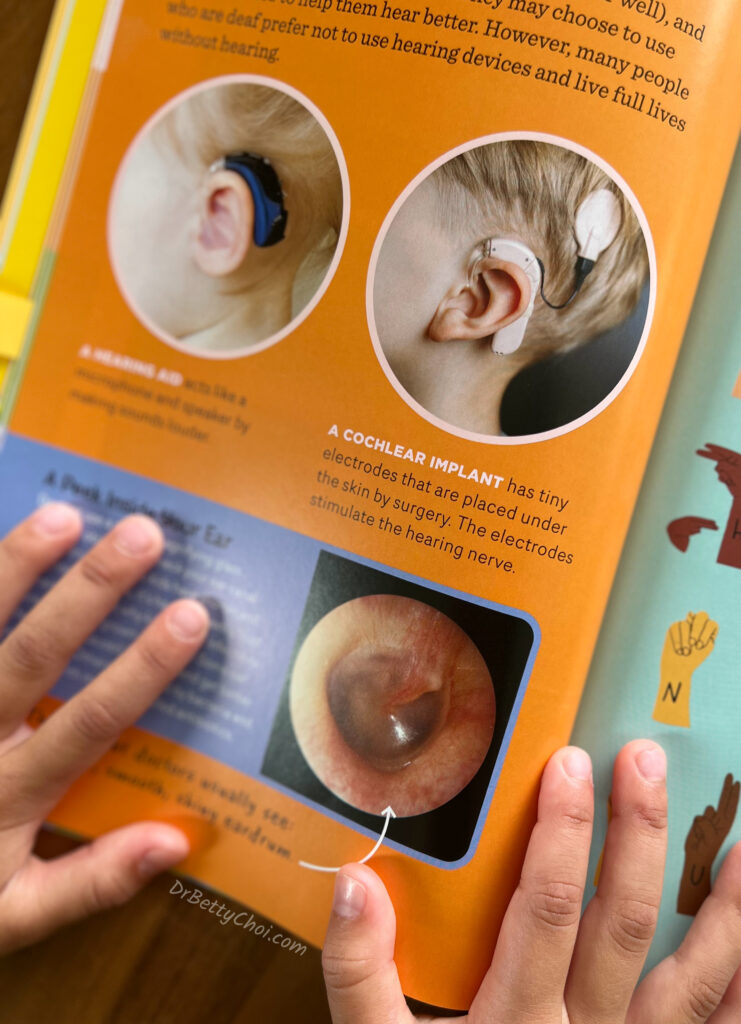
For children with hearing loss, we have them come back for hearing aid consultations, then hearing aid fittings/follow-up programming and testing if they choose to go that route.
I specialize in cochlear implants – so evaluations, activations, and programming are another set of appointments that I get to do.
Our days are fast paced, start early and can go late. I get to work, look at my schedule, prep anything needed if anything had changed and see patients. I complete paperwork in between and try to keep on schedule.
At the end of the day, I prepare for the next few days. I’m constantly talking with patients/parents or communicating with my co-workers since it takes a team. One manager is in charge of all the hearing aid equipment coming in/going out etc, another for cochlear implant equipment, another for clinical items.
I work at a hospital so it’s very busy, challenging cases come in and we have to put our heads together sometimes to figure things out. But audiology is so rewarding in the sense that we can see concerns, diagnose and rehabilitate.
We can see that giving answers to parents helps them, we can see that fitting devices opens up a whole new world of sound to patients, and we can see that being there for them as a support system and resource is invaluable.
What face masks do you recommended for people working or living with Deaf or Hard of Hearing children?
Everyone, not only children with hearing loss, uses visual cues whether or not they know it. So when masks take away the ability to read lips, we have a significant amount of difficulty. Masks also attenuate sound so there’s that.
When someone wears a clear mask, I can see facial and lip cues for communicating but not all of them feel safe for the wearer.
I personally love Clear Mask and Bendshape mask. Clear Mask has a model that is FDA-approved, and BendShape Mask goes snuggly all around.
What has been the most challenging part of being a pediatric audiologist?
Probably working with parents. We are seeing two sets of people – the patient and the parents.
Usually, the little patients don’t know any different. They don’t know what they are missing, so they go about life normally since having hearing loss IS their norm.
Often times parents come in, and it’s difficult because their child is going through something that they have no idea or experience with. So explaining things and trying to show parents a little bit into their child’s world can be challenging but amazing at the same time. This is what we are here for.
I was especially moved by a post where you discuss what you love about living with hearing loss. Would it be okay to share about this here?
Absolutely! I love having access to a silent space that’s only mine. But I love that it gives me access to connection. I have a story to tell – I’m here with a purpose and intention.
I really feel that my entire life – all of my personal experiences with hearing loss are optimized and utilized. My being/existence gives parents such relief and peace of mind – because they can see that I turned out just fine – they need to know that for their children.
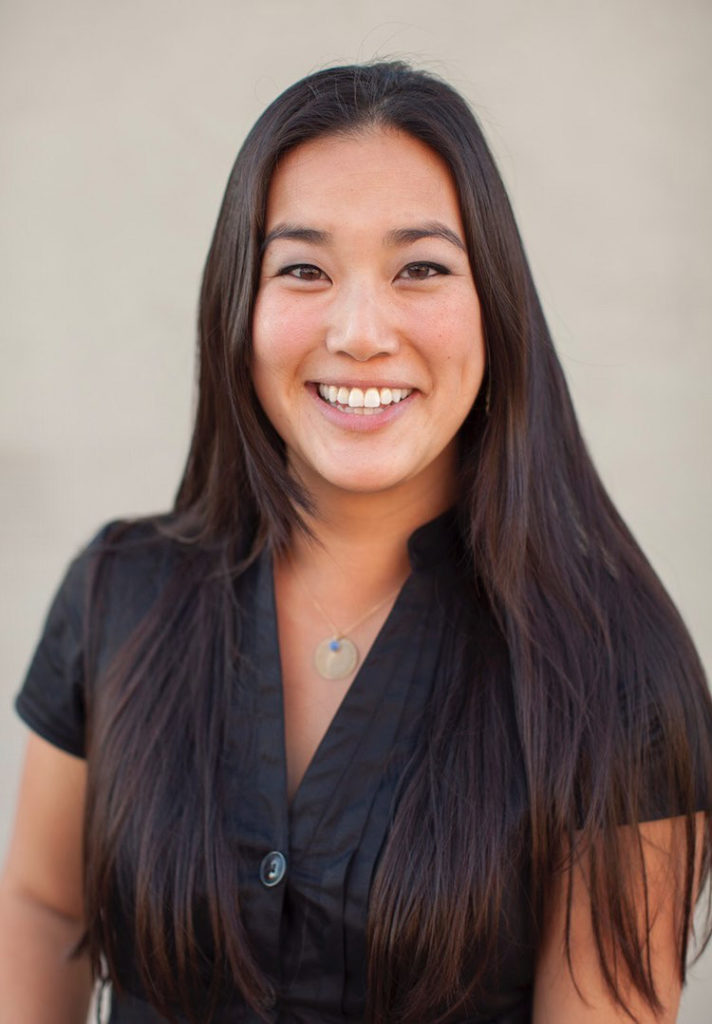
Thank you, Dr. Michelle Hu!
So grateful for Dr. Michelle Hu for taking the time to share her passion and experience in supporting families living with hearing loss!
Connect with Dr. Michelle Hu and learn more about living with hearing loss
Learn more about Dr. Michelle Hu’s expert advice, courses for parents and healthcare professionals, and pediatric audiology services on her website.
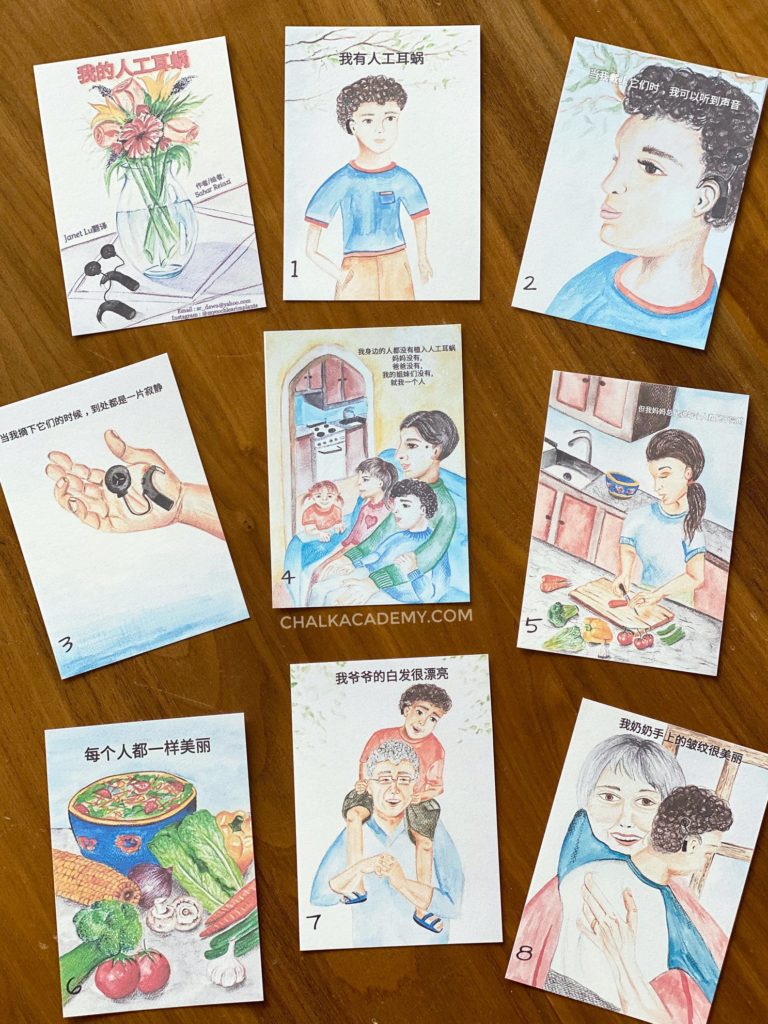
More resources for children and families living with hearing loss
National Association of the Deaf
Books
- My Cochlear Implants by Sahar Reiazi; available in English, simplified & traditional Chinese, Spanish, Farsi, Turkish, Japanese, & Indonesian
- Free e-book on author’s website
- Buy on Kindle to support the author (affiliate link)
Interviews with multilingual families
We’re not alone in this journey! Here are more parents that inspire me on this multilingual parenting journey:
- Inspired by Her Child, An Author Writes Chinese Books with Pinyin and English
- Cantonese-Australian Mother Shares Chinese Bible Activities for Kids (Printable)
- Teaching Minority Languages to Kids: A New Approach Can Help
- Raising Trilingual Kids: Insights From Korean-Taiwanese-American Parents
- 5 Strategies That Encourage A Child to Love and Speak the Minority Language